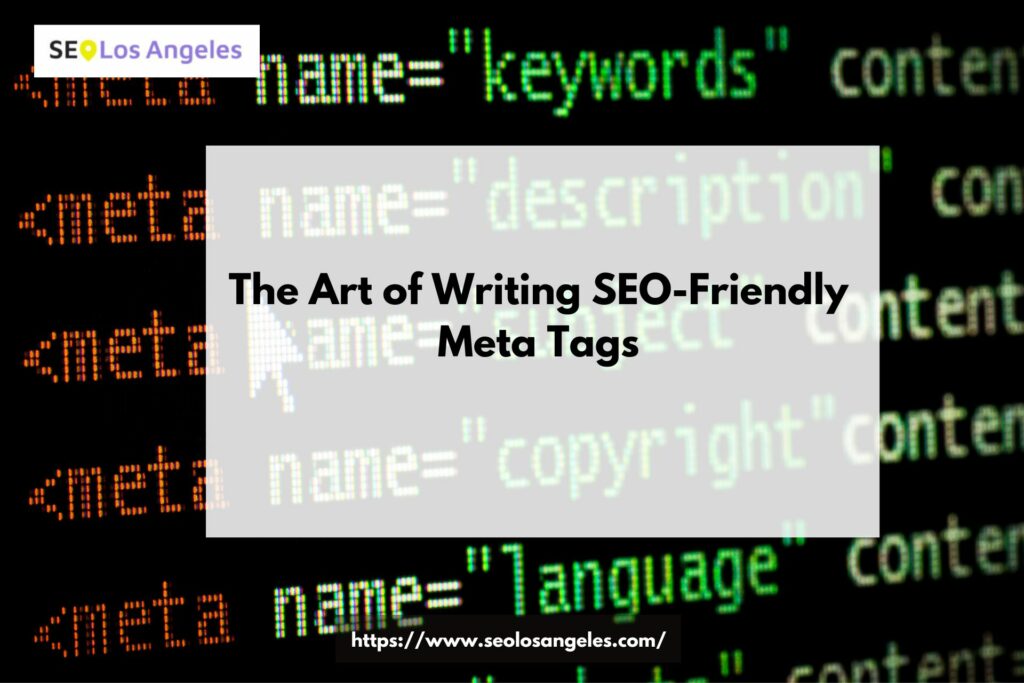Introduction
Meta tags play a crucial role in improving the visibility and search engine rankings of web pages. Crafting effective and SEO-friendly meta tags requires careful consideration and strategic optimization. In this article, we will delve into the art of writing SEO-friendly meta tags, exploring the best practices and techniques to help your web pages outrank others.
1. Understanding Meta Tags
Before we dive into the art of writing SEO-friendly meta tags, let’s clarify what they are. Meta tags are snippets of HTML code that provide information about a web page to search engines and website visitors. They appear in the page’s source code and are not visible on the actual page itself.
2. The Importance of SEO-Friendly Meta Tags
SEO-friendly meta tags contribute to improving your website’s search engine rankings and click-through rates. When done correctly, they enhance the visibility of your web pages in search engine result pages (SERPs) and attract potential visitors. Here are some key reasons why SEO-friendly meta tags are essential:
- Improved Click-Through Rates: Well-crafted meta tags can entice users to click on your website’s link when it appears in search results.
- Enhanced Search Visibility: Meta tags provide search engines with relevant information about your web page, helping them understand its content and purpose.
- Targeted Traffic: By optimizing meta tags, you can attract visitors who are specifically searching for the type of content your page offers.
3. Writing Effective Meta Titles (H1 Tags)
The meta title, also known as the H1 tag, is one of the most critical elements of a web page. It appears as the clickable headline in search engine results. To craft an effective meta title:
- Include Focus Keywords: Incorporate relevant keywords within the first 60 characters of the title.
- Be Compelling: Create a title that captures attention, generates curiosity, and encourages users to click through.
- Maintain Relevance: Ensure the meta title accurately reflects the content of the web page.
4. Crafting Engaging Meta Descriptions (H2 Tags)
The meta description, or the H2 tag, provides a concise summary of your web page’s content. It appears below the meta title in search results. To write an engaging meta description:
- Include Focus Keywords: Incorporate your focus keywords within the first 155 characters of the description.
- Be Descriptive: Provide a clear and compelling overview of what users can expect from your web page.
- Use a Call-to-Action: Encourage users to take action by using action-oriented language.
5. Optimizing Meta Keywords (H3 Tags)
In the past, meta keywords played a significant role in SEO. However, search engines have evolved, and their algorithms no longer consider meta keywords as a ranking factor. It is no longer necessary to spend time optimizing meta keywords.
6. Using Structured Data and Schema Markup (H3 Tags)
Structured data and schema markup provide search engines with additional information about your web page’s content. By incorporating structured data, you can enhance the way search engines understand and display your website in search results.
7. Keeping Meta Tags Relevant and Fresh (H4 Tags)
As search engines continually refine their algorithms, it is crucial to keep your meta tags up to date and relevant. Regularly review and refresh your meta tags to ensure they accurately represent the content of your web pages.
Conclusion
Crafting SEO-friendly meta tags is an art that requires careful thought and optimization. By following the best practices outlined in this article, you can improve the visibility and search engine rankings of your web pages. Remember to continuously monitor and refine your meta tags to stay ahead of the competition and attract targeted organic traffic.
FAQs (Frequently Asked Questions)
Q1: How many meta tags should I include on each web page?
A1: It is recommended to include one meta title, one meta description, and relevant structured data per web page. Avoid keyword stuffing or over-optimization.
Q2: Can I use the same meta tags for multiple pages?
A2: While you can use similar meta tags, it’s best to customize them for each page to ensure accuracy and relevance.
Q3: Are meta tags the only factor affecting search engine rankings?
A3: No, meta tags are just one of the many factors that influence search engine rankings. Other factors include content quality, backlinks, page load speed, and user experience.
Q4: How often should I update my meta tags?
A4: It’s a good practice to review and update your meta tags periodically or whenever you make significant changes to your web page’s content.
Q5: Can I use the same meta title as my main page heading?
A5: While it’s not necessary, it can be beneficial to use a similar or slightly modified version of your main page heading as your meta title for consistency and relevance.
